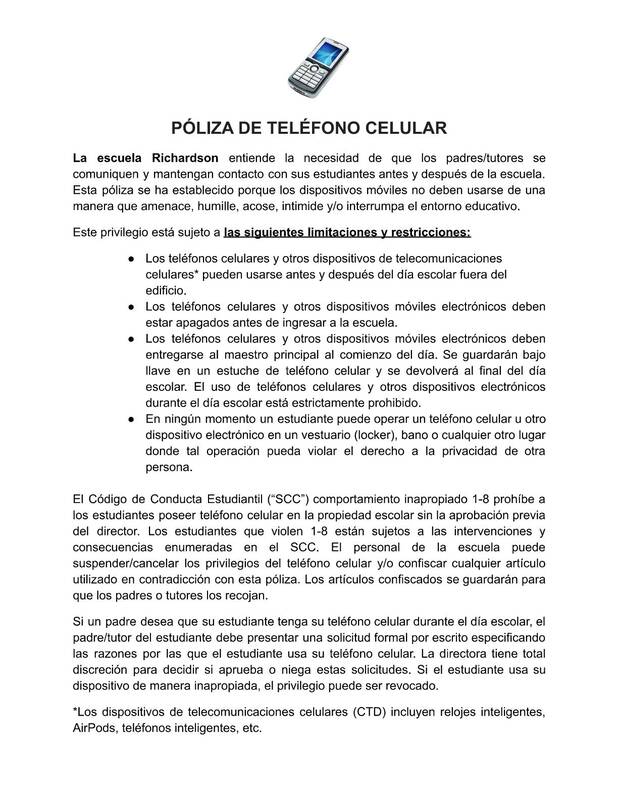Understanding Iowa's New Cell Phone Policy For Schools

Table of Contents
Key Provisions of the New Policy
Iowa's new cell phone policy for schools aims to create a more focused learning environment by regulating student cell phone use. While specific regulations may vary slightly between individual school districts, most policies share common elements. The core goal is to minimize disruptions and promote effective teaching and learning.
-
Designated Areas for Cell Phone Use: Many schools are designating specific areas, such as the cafeteria or designated outdoor spaces, where cell phone use is permitted during non-instructional time. These designated zones help to separate cell phone use from academic learning.
-
Consequences for Violating the Policy: Penalties for violating the policy typically range from verbal warnings to temporary cell phone confiscation, detention, and, in some cases, suspension. The severity of the consequence is usually determined by the frequency and nature of the infraction.
-
Specific Times Cell Phones are Permitted: The policy typically allows cell phone use before school, during lunch breaks, and after school. However, the exact timings may differ across schools. Classroom use is generally prohibited.
-
Exemptions for Students with Specific Needs: The policy often includes provisions for students who require cell phones for medical reasons, emergency contact, or those with documented disabilities. These students are usually provided with necessary accommodations.
For the complete and most up-to-date text of your school district's cell phone policy, please refer to your school's official website or contact the school administration directly.
Impact on Students
Iowa's new cell phone policy has significant implications for students. While aimed at enhancing learning, it presents both advantages and challenges.
-
Improved Focus and Classroom Engagement: By minimizing distractions, the policy aims to improve students' ability to concentrate on learning and participate actively in class.
-
Reduced Distractions: The policy seeks to curtail disruptions caused by ringing phones, texting, and other cell phone-related activities, enabling a more focused learning atmosphere.
-
Potential for Increased Social Isolation or Cyberbullying: While reducing distractions, the policy may inadvertently lead to social isolation for some students, especially if they rely on their phones for communication. It is important to be mindful of the potential for increased cyberbullying outside the school environment.
-
Challenges for Students who Rely on Phones for Communication or Accessibility: Students with specific needs or those who rely on phones for communication with family members or caregivers may face challenges. Schools must address these concerns through reasonable accommodations.
Impact on Teachers
The implementation of Iowa's new cell phone policy also significantly impacts teachers. It necessitates adjustments to classroom management and teaching strategies.
-
Changes in Classroom Routines: Teachers may need to adjust classroom routines to incorporate the new policy, including establishing clear procedures for cell phone storage and retrieval.
-
Increased Responsibility for Enforcing the Policy: Teachers bear the responsibility of enforcing the policy within their classrooms, which can add to their workload and responsibilities.
-
Need for New Strategies to Manage Student Cell Phone Use: Teachers need to develop effective strategies for managing student cell phone use, possibly requiring training or support from school administration.
-
Potential for Increased Workload Related to Cell Phone-Related Issues: Dealing with cell phone-related disruptions and addressing policy violations adds to the teacher's administrative duties.
Parental Involvement and Communication
Parents play a vital role in supporting the success of Iowa's new cell phone policy. Open communication and collaboration between parents, students, and schools are key to its effective implementation.
-
Open Communication with Their Children about Responsible Cell Phone Use: Parents should discuss with their children the rationale behind the policy, emphasizing responsible cell phone use and the importance of focusing on academics.
-
Working with School Administrators to Address Any Concerns: Parents should communicate any concerns or challenges related to the policy with school administrators to find mutually beneficial solutions.
-
Understanding the Policy's Rationale and Supporting its Implementation: Parents need to understand the policy's aims to create a productive learning environment and actively support its implementation.
Conclusion: Understanding and Navigating Iowa's New Cell Phone Policy for Schools
Iowa's new cell phone policy for schools aims to create a more focused learning environment by minimizing distractions caused by cell phones. The policy's key provisions include designated cell phone use areas, outlined consequences for violations, specified times for permitted use, and accommodations for students with specific needs. The policy impacts students, teachers, and parents, requiring adjustments to classroom routines, teaching strategies, and communication. Understanding Iowa's new cell phone policy is crucial for creating a positive and productive learning environment for all. For more detailed information on Iowa's new cell phone policy for schools, visit [link to relevant website - replace with actual link].

Featured Posts
-
 Aamir Khans Daughter Ira Reveals Surprise Encounter With Andre Agassi
May 30, 2025
Aamir Khans Daughter Ira Reveals Surprise Encounter With Andre Agassi
May 30, 2025 -
 Dmps Cell Phone Policy A District Wide Approach For Next School Year
May 30, 2025
Dmps Cell Phone Policy A District Wide Approach For Next School Year
May 30, 2025 -
 Analisa Harga Jual Kawasaki Z900 Dan Z900 Se Yang Lebih Rendah Di Indonesia
May 30, 2025
Analisa Harga Jual Kawasaki Z900 Dan Z900 Se Yang Lebih Rendah Di Indonesia
May 30, 2025 -
 Remembering Anna Neagle The Enduring Legacy Of A British Star
May 30, 2025
Remembering Anna Neagle The Enduring Legacy Of A British Star
May 30, 2025 -
 Country Diary Foraging For The Carrots Roastable Cousin
May 30, 2025
Country Diary Foraging For The Carrots Roastable Cousin
May 30, 2025
